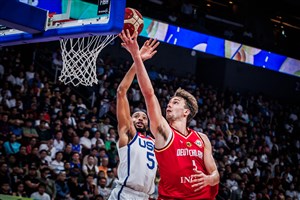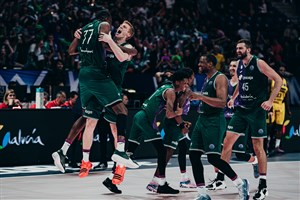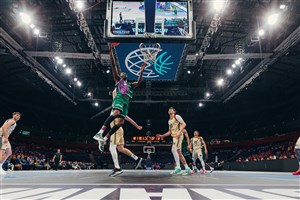
Real change that makes the game more exciting
MELBOURNE (Paulo Kennedy’s View from Downunder) - I must say I was pretty excited last off-season when I heard ULEB was convening a rules summit with experts from all areas of the game.
ULEB - who oversee the Euroleague and Eurocup - wanted suggested changes "to make the game faster, cleaner, fairer and more spectacular for participants and fans", something I've long been an advocate of.
After all, if we want basketball to grow and challenge as the world's number one sport, the game has to consistently show off what makes it so great to watch - the skills and athleticism of the players.
Anyway, it's fair to say I was pretty dismayed when ULEB's summit came back with jump balls, one less free-throw for technical fouls, one time-out shortened by 30 seconds and end-of-quarter intervals also docked half a minute.
I tune into Euroleague and Eurocup games every week, I've been a big fan for many years, but what I see this year is intentional foul after intentional foul to slow the game down and prevent exciting plays going to the basket.
Now if ULEB want to "make the game faster, cleaner, fairer and more spectacular" how about dealing with this blight on the sport?
What's worse for mine is that refs in ULEB competitions this season seem to be putting the whistle away, perhaps under the mistaken direction that this lets the game flow. Nothing could be further from the truth.
Constantly allowing fouls to pass creates inconsistency, frustrations for players, coaches and fans, and allows the defence to play more aggressively than the offence.
It's an issue the NBL had to face this past off-season, but they did it very differently.
Three of Australia's most experienced officials - Mal Cooper, Bill Mildenhall and Ray Hunt - were brought together with a rule book and a clear directive to make the game more exciting.
Their solution was quite simple. Call the game by the rules. Don't judge the situation, call the game.
Illegal hand contact was to be called. Body contact when not in a legal stance was to be called. In a charge-block situation the benefit of any doubt goes with the offence. Fouls that weren't an attempt to play legitimate defence were called unsportsmanlike.
It sounds easy but it wasn't. Refs and players had lots of bad habits to get out of. There have been ups and downs but the change on the court has been spectacular - literally.
Scoring has risen from 76 points to 85 a game, shooting has gone up from 42 per cent from the field to 46 and 33 per cent from deep to 36.
More importantly, the game is clean on the eye - players can make plays, exciting plays. The offensive team is aggressive and the game flows. Defensive teams can still defend but they have to do so in a technically correct manner.
That's how basketball should be. All around the world, teams push the limits with their physicality as it wins games. But it's up to administrators and officials to keep that in check so the game can attract fans.
The NBL's model isn't perfect for ULEB competitions as the style of play is different, but the template of calling the game consistently by the rule book, while allowing strong body contact, is a European tradition that ULEB should get back in touch with.
I also feel the international game slipped a little bit down the path of letting calls go for the sake of 'flow' at times recently.
The question I ask, is with players like Kevin Durant, Chris Paul, Juan-Carlos Navarro, Andres Rodriguez, Vasileios Spanoulis, Tony Parker, Patrick Mills, Manu Ginobili and Co gracing FIBA courts, don't we want to see as much of their skill as possible?
To me that should be a priority.
Of course, what the NBL is doing isn't perfect. The obvious inconsistencies we've seen in the first two playoff games show applying that style in the most intense of games is still a work in progress.
But looking over the whole season the transformation of the spectacle on-court has been remarkable. The refs and their management team deserve enormous credit for what they have done.
Our previously underrated players have been freed up to show off their skills and athleticism - basketball's point of advantage over other sports.
After the playoffs I'll have a more thorough look at what the NBL's reffing crew need to keep doing, keep improving and change for next season.
For now though, let's have a look at those intentional fouls. They're becoming a major blight on our game all around the world and I think FIBA needs to take action, as does the NBA.
Here are some of my ideas:
1. Call them unsportsmanlike fouls (USF). The rule states a USF can be called if there is "not a legitimate attempt to directly play the ball". Most of these fouls are obviously deliberate acts to stop the play.
2. If the two shots and possession penalty is deemed too harsh, reintroduce the Intentional Foul with one shot and possession.
3. Encourage refs to hold their whistle and assess whether advantage can be allowed. Why are touch fouls called on a fastbreak when the same contact is let go in the halfcourt?
And if you really want to stamp these fouls out here are two slightly left-field ideas:
1. Conduct post-game reviews as the NBA does with flops. If a foul is judged to be intentional, issue a warning. Subsequent offences could incur a greater punishment, such as a suspension.
2. Allow refs to play advantage but then also call the foul at the next break in play, similar to how advantage is used in rugby union. That would strip away the benefits of committing such fouls and leave our athletes to make athletic plays
I sincerely hope action is taken on this issue, simply "to make the game faster, cleaner, fairer and more spectacular for participants and fans".
Paulo Kennedy
FIBA
FIBA's columnists write on a wide range of topics relating to basketball that are of interest to them. The opinions they express are their own and in no way reflect those of FIBA.
FIBA takes no responsibility and gives no guarantees, warranties or representations, implied or otherwise, for the content or accuracy of the content and opinion expressed in the above article.

















